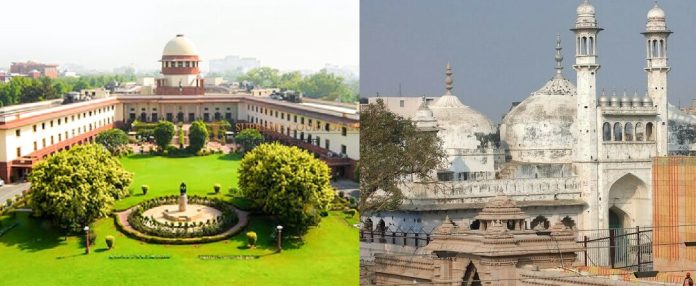
By Anwarulhaq Baig
New Delhi, Nov. 5, 2023:
The Supreme Court has rejected the appeal of the Gyanvapi Masjid committee challenging the Allahabad High Court Chief Justice’s order to transfer the case from a single-judge bench to his bench.
The Anjuman Intezamia Masjid Committee in Varanasi, which manages the Gyanvapi mosque, filed a Special Leave Petition in the Supreme Court, challenging the High Court Chief Justice Pritinker Diwaker’s order to transfer the case related to the recent dispute surrounding the Gyanvapi mosque, which resurfaced in 2021 after Hindu worshippers sought permission to worship inside the mosque.
A three-judge bench of the Supreme Court, led by Chief Justice of India DY Chandrachud, on Friday refused to interfere with the High Court Chief Justice’s order, saying that Chief Justice Diwaker had indicated reasons in his August 28 order.
In August 28 order, Chief Justice Diwaker referred to an administrative order issued by the High Court in 2013, which stated that no ongoing civil or criminal cases should be considered part-heard or tied to a specific judge after the commencement of a new roster.
During the proceedings, Senior Advocate Huzefa Ahmadi, representing the Masjid Committee, told the Supreme Court that a High Court bench led by Justice Prakash Padia had already completed the hearings in the case and was set to deliver a judgment on August 25. “However, on the same day, Chief Justice Diwaker removed the case from Justice Padia, arguing that the judge should not have retained the case following the change in the roster.”
Replying to Ahmadi, CJI Chandrachud noted that the previous judge had reserved the verdict in 2021 after conducting 75 hearings but had not delivered it. Ahmadi contended that they wouldn’t have challenged Chief Justice Diwaker’s decision if it hadn’t constituted an abuse of the legal process.
Emphasizing that it’s not within a litigant’s purview to dictate which judge should hear a case, Ahmadi pointed out that the single judge had been handling the matter since 2021 and continued to do so in 2023 after the subject roster was reassigned to them. Two days after the single judge reserved the verdict, a complaint was filed before Chief Justice Diwaker against Justice Padia retaining the matter. According to Ahmadi, this timing suggested that the complaint was driven by not genuine concerns.
Ahmadi argued that the single judge had been hearing the matter throughout with the consent of all parties and the complaint was filed only after the judgment was reserved after seeing “where the wind is blowing to”.
In response, CJI said, “look at what the learned Chief Justice Diwaker said in the last three lines – we don’t want to read it in open court. You must know what weighed with us. The last sentence particularly. This is extraordinary. Never happened. It goes back to the registry, can’t be in chambers of the judge. There are grounds by Chief Justice Diwaker. We’ll leave it at that. I don’t want to say much, there is a reason for it.”
The Masjid Committee has filed petitions challenging the maintainability of suits filed by Hindu worshippers seeking the right to worship in the Gyanvapi mosque, which is prohibited under the Places of Worship (Special Provisions) Act 1991.
Gyanvapi Mosque in Varanasi is situated in close proximity to the Kashi Vishwanath Temple. It is pertinent to mention here that this historical dispute regarding the mosque’s origins first came to the attention of India’s legal system in 1991, when some Hindu priests initiated legal proceedings in a Civil Court in Varanasi, seeking permission to worship within the mosque, arguing that the mosque was constructed on the site where a portion of the Kashi Vishwanath Temple had been demolished by Mughal Emperor Aurangzeb in 1669. But, the Allahabad High Court put a halt to the proceedings in 1998.
However, after 2019 Supreme Court’s verdict in favour of Ram temple in Ayodhya, five Hindu women associated with the Vishwa Vedic Sanatan Sangh filed a petition in a Varanasi Civil Court, in 2021 seeking right to worship inside the mosque.
The local Muslims reject the notion that Aurangzeb had demolished the temple. Former Imam of the Gyanvapi Mosque Maulana Abdus Salam Nomani claimed that the mosque was built long before Aurangzeb’s rule and that Shah Jahan had supposedly established a madrasah at the mosque in 1638-1639. Anjuman Intezamia Masjid supports Nomani’s stance and maintains that both the new Kashi Vishwanath Temple and the Gyanvapi Mosque were constructed by Akbar, in accordance with his principles of religious tolerance.
In a related development, the Varanasi District Judge issued a directive instructing the Archaeological Survey of India (ASI) to present its report on the Gyanvapi Mosque Survey to the Court by November 17.
District Judge AK Vishvesha issued this order after the ASI informed the Court on Thursday that it had already completed its survey of the mosque premises and now, the technical members of the ASI were in the process of preparing a comprehensive report based on their findings.
It’s worth noting that the ASI had been conducting a scientific survey of the Gyanvapi complex in Varanasi, in accordance with the July 21 order from the Varanasi District Judge with the objective to decide whether the mosque was constructed over a pre-existing structure of a Hindu temple.
On August 4 this year, the Supreme Court refused to halt the ASI from conducting a survey of the Gyanvapi Mosque, with the exception of the ‘wuzukhana’ area.




